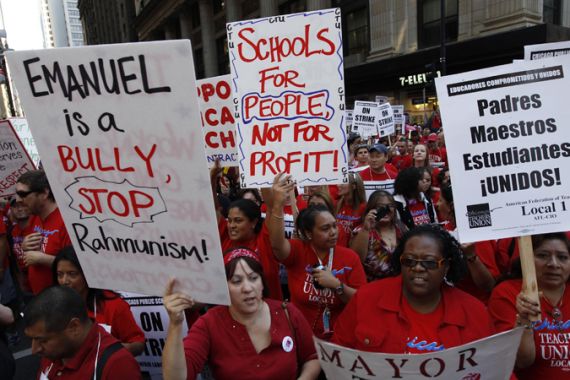Saving the Chicago public school system: Who’s hurting the kids?
By going on strike, the teachers are “building political power”, putting themselves in a “position to force changes”.

If you’ve read – or watched – anything about the Chicago schoolteachers’ strike, you’ve probably heard that this labour action selfishly puts adult interests over those of children. It’s all about money, the propaganda machine assures us. Worse, it’s hurting children.
This last claim – made, as it usually is, with a sentimental and vaguely pornographic leer – is the most inflammatory. It’s also a lie.
One might expect this sort of distortion from the media, or from the far right. It is no surprise that conservative vice-presidential candidate Paul Ryan opposes the teachers’ union. But the very enemy the teachers are fighting, Chicago Mayor Rahm Emanuel, is a Democrat. Scolding the teachers (“Don’t take it out on the kids of the city of Chicago if you’ve got a problem with me”), he calls the strike the “wrong choice for our children”.
And in the punditocracy, some of the loudest bleating about how the strike is hurting children comes from liberals, including Dylan Matthews, a Washington Post blogger whose credentials include being old enough to drink legally, and having graduated from Harvard in May.
The New York Times editorialised that teachers’ strikes, “because they hurt children and families, are never a good idea”.
Standardised tests
Liberals, you know what hurts children? Look in the mirror. Your complicity with a regime of austerity that deprives poor people’s kids of everything they need in order to thrive. That’s what the teachers are protesting. Not only are they seeking to improve their own dismal labour conditions, they are fighting to save Chicago’s public schools – and kids – from Democratic politicians who seek to destroy them.
|
“Keeping class sizes small is one of the few proven ways to narrow the achievement gap between rich and poor children.” |
The educators are asking for better learning conditions for the children they teach, including smaller class sizes. In early grades, it is well documented that large class sizes hurt student achievement. Keeping class sizes small is one of the few proven ways to narrow the achievement gap between rich and poor children.
It doesn’t matter how you measure that “achievement” – whether it’s scoring well on standardised tests, graduating on time, graduating with honours, graduating at all, attending college, the children in the smaller classes do better. Despite this research, class sizes in Chicago – under Democratic mayors – have increased steadily over the past two decades, with one kindergarten teacher telling the New York Times today that she has 43 five-year-olds in her class. This “hurts children”.
Chicago teachers are also protesting a testing regime that only rewards schools for performance gains on reading and writing. With budgets brutally stretched, in a system that punishes poor test scores by closing down schools and firing teachers, the arts have also suffered in Chicago’s schools.
In 2011, only a fourth of the city’s neighbourhood schools had a full-time art teacher and a full-time music teacher, and 42 per cent of them had neither. Mayor Emanuel obviously knows that such a state of affairs is intolerable for children, as he sends his own to a progressive school with whose director staunchly opposes standardised testing, as labour journalist Mike Elk has reported in In These Times. Standardised testing also hurts children, though not Mayor Emanuel’s children.
No libraries
Blowhards on Twitter, op-ed pages and other venues far from the reality of urban Chicago blame all the problems of public schools on teachers. But last February, in a report called, “The Schools Chicago’s Students Deserve”, the union pointed out the schools’ horrifying poverty, noting that 160 Chicago schools do not have libraries, and few offer foreign language classes.
If the city were to stop spending vast sums of money on privatisation experiments, it would cost relatively little to give all Chicago children the well-rounded, quality education they need. By going on strike, the teachers are building political power, putting themselves in a position to force such changes.
That’s probably why so many parents support the teachers. The Murdoch-owned Wall Street Journal, which loves neo-liberal school reform and hates teachers, in a news story today, attempted to show how disruptive the strike was for working-class families. This was not, of course, difficult to demonstrate.
Whether parents work in offices or a bakery, bringing kids to work is stressful, and in some jobs simply untenable. Yet most parents interviewed in the Journal article supported the teachers’ strike.
Indeed, a poll today published by the Chicago Sun-Times, a Democratic-leaning paper biased against the teachers, found that – even using “likely registered voters”, a poll sample that would likely be more conservative than the general population – nearly half the Chicago residents surveyed supported the strike.
Sure, it’s inconvenient for parents to find childcare – or bring kids to work – when teachers are on strike. It’s also inconvenient to go to the doctor, or take medicine, but worth it if the patient would otherwise die. Public education can’t be saved without a serious political shock to the system. Chicago’s teachers understand that.
Liza Featherstone is a public school parent in Brooklyn, New York. She’s also a contributing writer to The Nation, and writes on education for Newsday, the Brooklyn Rail and many other publications.
